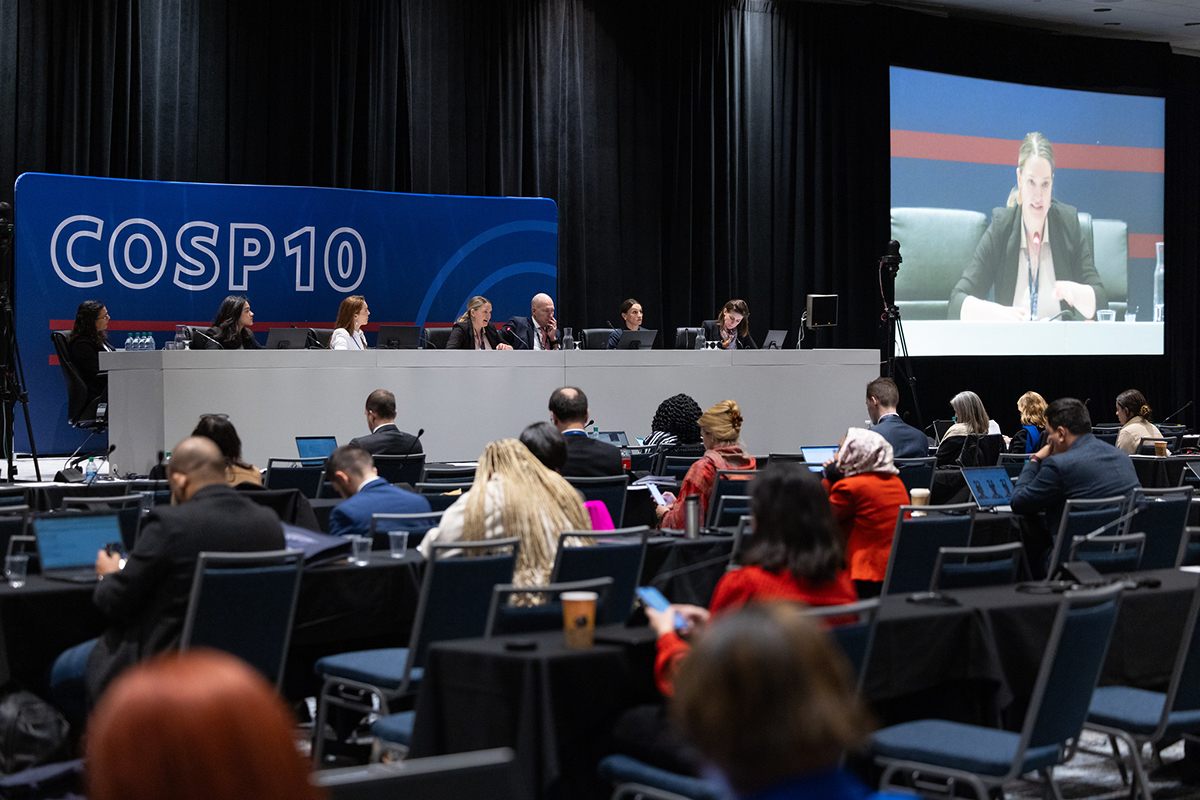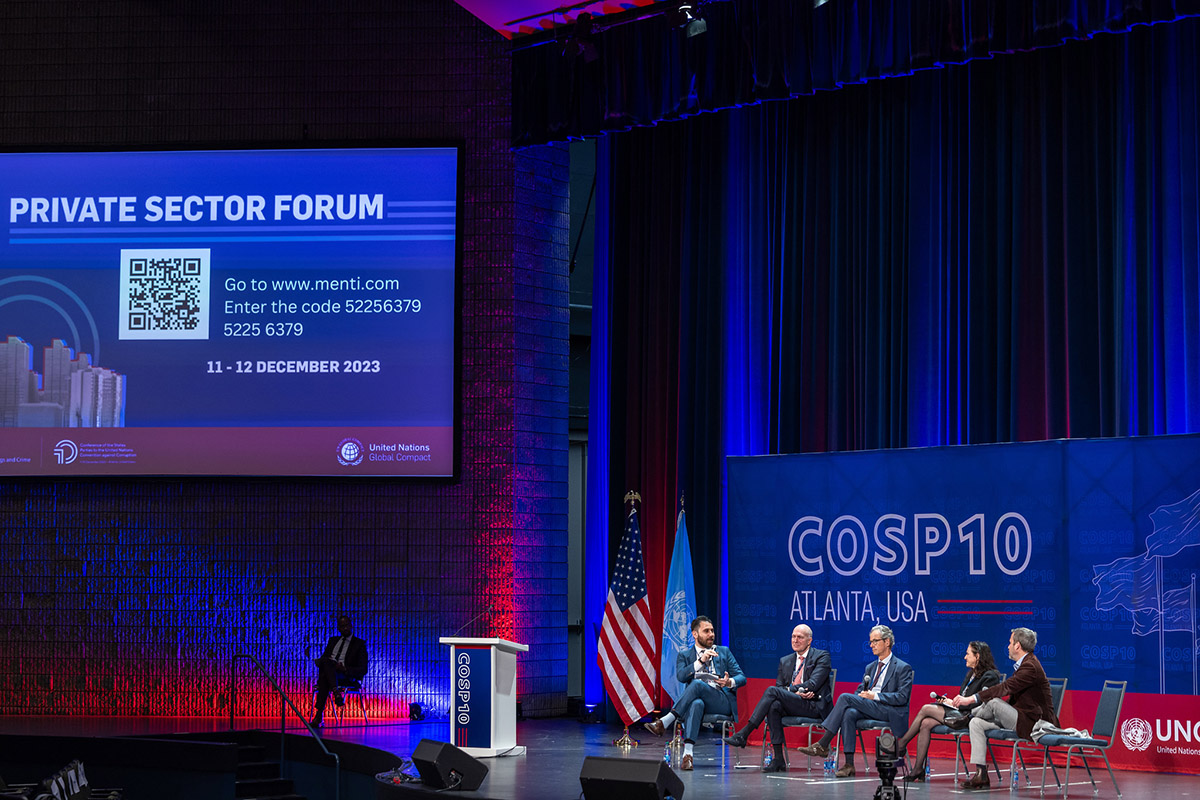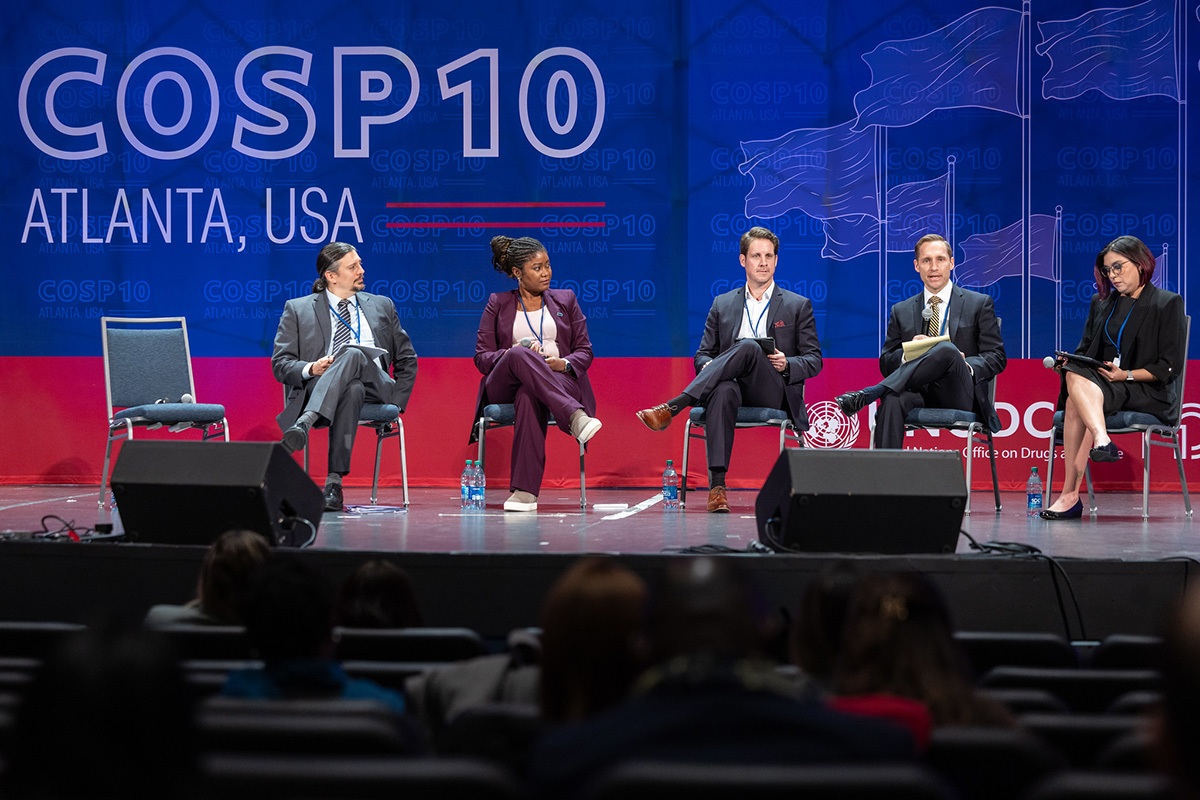Sticks and carrots: New UN Resolution calls on governments to provide incentives for companies to implement anti-corruption measures

Business integrity was among the priority topics at the 10th session of the Conference of the States Parties (CoSP) to the United Nations Convention against Corruption (UNCAC) in December 2023. For the first time ever, the United Nations Office on Drugs and Crime (UNODC) together with the United Nations Global Compact (UNGC) hosted a Private Sector Forum in the margins of CoSP10.
Serving as a partner of the Forum, the Basel Institute welcomes the UN’s efforts to bring businesses to the table on anti-corruption and business integrity. A new CoSP10 Resolution dedicated to the private sector opens opportunities for Collective Action initiatives, whereby businesses, civil society and governments can jointly engage to implement the international commitments at the national level.
UN engages with businesses on anti-corruption
In the two decades since the adoption of the UNCAC, significant transformations have taken place both for businesses and the environments in which they operate. A growing number of countries have implemented legislation focusing on corporate compliance and the criminalisation of unethical business practices.
Gone are the days of tax-deductible bribes. Today, the expectations on businesses from regulators, investors, customers, employees and other stakeholders are higher than ever.
The private sector has an important role to play in the fight against corruption, contributing significantly to the establishment of transparent, accountable and ethical business environments. As major drivers of economic growth and innovation, private enterprises possess considerable influence and resources that can be harnessed to promote integrity and catalyse positive change.
Meaningful engagement of diverse stakeholders, including from the business community, in multilateral fora like the CoSP, the UN’s major anti-corruption conference, increases transparency and accountability. It can also contribute to more effective policies that reflect the diversity of contexts and challenges faced by businesses worldwide.
Private sector ready to join new platform for collaboration
The first ever Private Sector Forum at CoSP10 established a new platform for collaboration on business integrity – and the business community was ready to engage.
The Forum discussed how governments can create enabling frameworks for business integrity through a combination of carrots and sticks, i.e., measures that incentivise compliance while ensuring that misconduct is sanctioned.
Discussions also drew on insights from an updated Resource Guide on State Measures for Business Integrity that UNODC, UNGC and the Organisation for Economic and Co-operation and Development (OECD) released prior to the event.
A session moderated by Gretta Fenner, Managing Director of the Basel Institute on Governance, showcased how Collective Action initiatives can drive impact to foster more ethical and transparent business environments. Other discussions revolved around joining forces to standardise best practices on anti-corruption in the supply chain, and the role of investors in reinforcing business integrity through Environmental, Social and Governance (ESG) frameworks.
The Forum showed that there is great appetite from businesses to participate in shaping the global business integrity agenda. In a call-to-action, put forward before the 20th anniversary of the UNCAC and presented to delegates at the CoSP, more than 500 companies from around the world urged governments to intensify anti-corruption efforts worldwide and foster Collective Action in the fight against corruption.
New CoSP Resolution focuses on private-sector incentives
It seems that government delegates heard the private sector’s appeal: they agreed on a new Resolution dedicated to the private sector, tabled by Brazil, Norway and Saudi Arabia.
The Resolution acknowledges the importance of governments fostering a conducive environment for the private sector to adopt and implement effective integrity measures to prevent and combat corruption.
It calls upon governments to “develop effective frameworks to provide incentives for the private sector to adopt integrity measures, including codes of conduct” and to “implement robust internal governance and risk management systems for preventing acts of corruption”.
CoSP Resolutions are not binding. However, they set standards for the implementation of the UNCAC and States parties are expected to take action to implement them. In brief, this Resolution covers:
- Tangible benefits: Governments should consider providing tangible benefits to companies. These might include public recognition and taking a company’s anti-corruption efforts into account in decisions relating to participation in public programmes, such as those related to subsidies, licences, procurement contracts and export credits.
- Incentives for enforcement: Governments should consider the effectiveness of a company’s compliance programme when holding them liable for corruption. Additionally, the Resolution invites States parties to explore the possibility of providing incentives for companies to voluntarily disclose instances of corruption and cooperate effectively with national law enforcement authorities. Furthermore, it suggests that when employing alternative legal mechanisms, such as settlements or non-trial resolutions, governments should consider offering appropriate incentives for companies entering such procedures to commit to developing or strengthening their anti-corruption compliance programmes.
- Evaluating compliance programmes: Governments should consider adopting laws, regulations and public policies to adequately evaluate compliance programmes. That includes developing and making publicly available guidelines, methodologies and other evaluation tools.
What’s new, what’s missing and next steps
The idea of incentives is not new to the CoSP. Already in 2019, Resolution 8/6 encouraged States parties to consider providing appropriate incentives for the effective implementation of anti-corruption ethics and compliance programmes or measures. However, this time around, the Resolution gives more concrete examples of what these incentives could look like.
Also on the plus side, the Resolution enables information exchange by calling for concrete efforts to provide technical assistance and exchange best practices among States. It also directs the Open-ended Intergovernmental Working Group on the Prevention of Corruption, a subsidiary body of the CoSP, to discuss incentives for the private sector in its future meeting. This literally puts business integrity on the agenda for the coming years.
It is encouraging that the focus is not solely on law enforcement but that the Resolution embraces a proactive approach to engaging with the private sector for the prevention of corruption. In this regard, the Resolution can create a space for private sector-driven Collective Action initiatives as well as civil society working with the private sector to engage with governments in their countries on how to best incentivise business integrity on a national level.
However, it is a missed opportunity that the idea of incentivising companies’ engagement in Collective Action is not explicitly mentioned. Business engagement in Collective Action can help to level the playing field between competitors and be a game changer for raising integrity standards in industries and markets.
This September, UNGC will be celebrating 20 years of the 10th principle of the UN Global Compact committing companies to proactively develop policies and programmes to address corruption internally and within their supply chains. Hopefully, this upcoming anniversary will help to keep up the momentum for business integrity and Collective Action and ensure that governments involve the private sector when putting the recommendations of the Resolution into action.
Learn more
- The Report on the CoSP10 and Private Sector Forum will be made available on the CoSP website.
- See our guidance documents on Engaging the private sector in Collective Action against corruption: A practical guide for National Anti-Corruption Agencies and Engaging the private sector in Collective Action against corruption: A practical guide for anti-corruption agencies in Africa
- View photos from the Private Sector Forum by the UN Global Compact.





